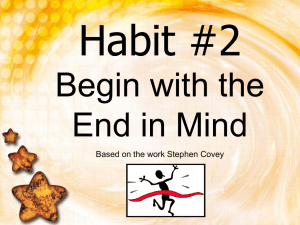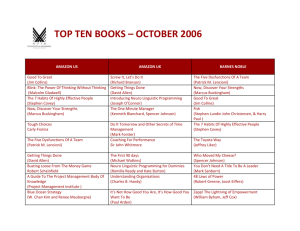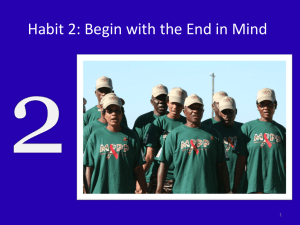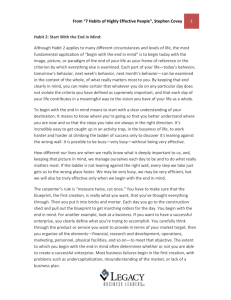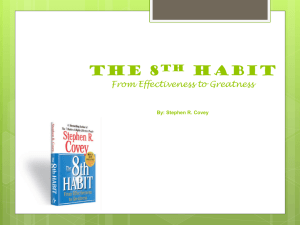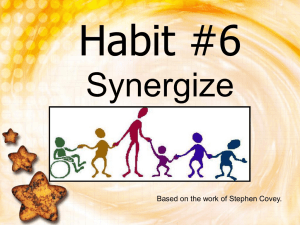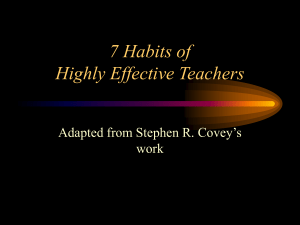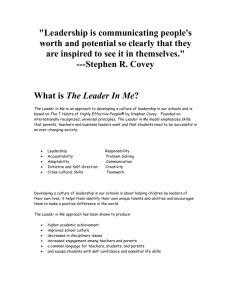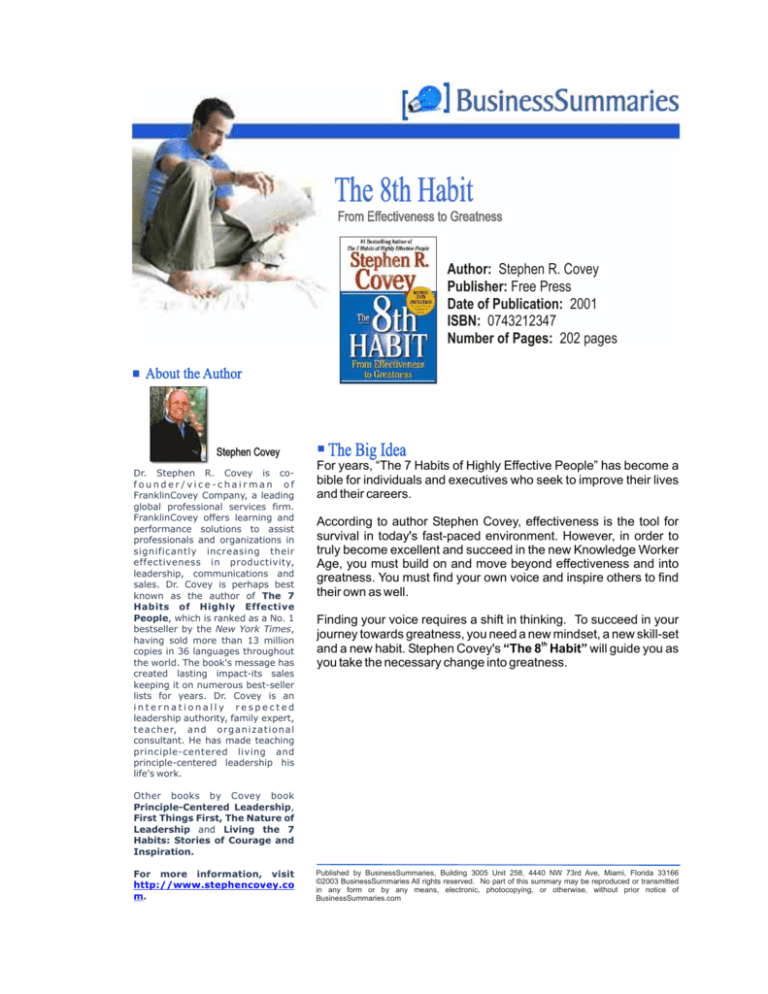
The 8th Habit
From Effectiveness to Greatness
Author: Stephen R. Covey
Publisher: Free Press
Date of Publication: 2001
ISBN: 0743212347
Number of Pages: 202 pages
About the Author
Stephen Covey
Dr. Stephen R. Covey is cofounder/vice-chairman of
FranklinCovey Company, a leading
global professional services firm.
FranklinCovey offers learning and
performance solutions to assist
professionals and organizations in
significantly increasing their
effectiveness in productivity,
leadership, communications and
sales. Dr. Covey is perhaps best
known as the author of The 7
Habits of Highly Effective
People, which is ranked as a No. 1
bestseller by the New York Times,
having sold more than 13 million
copies in 36 languages throughout
the world. The book's message has
created lasting impact-its sales
keeping it on numerous best-seller
lists for years. Dr. Covey is an
internationally respected
leadership authority, family expert,
t e a c h e r, a n d o r g a n i z a t i o n a l
consultant. He has made teaching
principle-centered living and
principle-centered leadership his
life's work.
The Big Idea
For years, “The 7 Habits of Highly Effective People” has become a
bible for individuals and executives who seek to improve their lives
and their careers.
According to author Stephen Covey, effectiveness is the tool for
survival in today's fast-paced environment. However, in order to
truly become excellent and succeed in the new Knowledge Worker
Age, you must build on and move beyond effectiveness and into
greatness. You must find your own voice and inspire others to find
their own as well.
Finding your voice requires a shift in thinking. To succeed in your
journey towards greatness, you need a new mindset, a new skill-set
and a new habit. Stephen Covey's “The 8th Habit” will guide you as
you take the necessary change into greatness.
Other books by Covey book
Principle-Centered Leadership,
First Things First, The Nature of
Leadership and Living the 7
Habits: Stories of Courage and
Inspiration.
For more information, visit
http://www.stephencovey.co
m.
Published by BusinessSummaries, Building 3005 Unit 258, 4440 NW 73rd Ave, Miami, Florida 33166
©2003 BusinessSummaries All rights reserved. No part of this summary may be reproduced or transmitted
in any form or by any means, electronic, photocopying, or otherwise, without prior notice of
BusinessSummaries.com
The 8th Habit by Stephen Covey
The Pain, The Problem and the Solution
The Pain
People become dissatisfied with their jobs for various reasons. These reasons
include stress, pressure, terrible bosses, feelings of frustration, and a host of other
things. Overworked, underpaid and under-appreciated employees end up affecting
the productivity and effectiveness of an organization adversely.
More and more companies are expecting their employees to produce more for less.
Furthermore, some companies do not utilize their employees' talents and
intelligence to the full extreme. As a result, employees feel that they are not growing
within the company. Even worse, employees are left in the dark without a clear vision
of where the company is headed.
The Problem
New developments in technology and globalization have ushered in changes in the
way people think and operate.
The 20th century was known as the Industrial age. As the new millennium unfolds,
civilization is now moving towards a new age - the age of information or the
Knowledge Worker Age. This is where the problem begins.
Managers still insist on operating under the controlling mindset of the industrial age.
Employees are treated as objects that can be controlled. Lower-level staff members
are also not given the opportunity to act on a problem or to come up with solutions on
their own.
This paradigm leads to a culture of co-dependency and compliancy. In this culture, a
worker loses his voice because he believes that his views are not significant enough.
The Solution
·
·
Find your voice.
Ø Recognize and develop your true nature.
Ø Express your voice through vision, discipline, passion and
conscience.
Inspire others to find their own voice. Live and set an example of what you
have learned.
Find Your Voice
Discover Your Voice - Unopened Birth-Gifts
Each individual is born with the potential to be great. What you do with this potential is
up to you. You must remember that the more you use and expand your present
[2]
The 8th Habit by Stephen Covey
talents, the more capacity you are given, and the greater your ability becomes.
Three Most Important Gifts
1. Freedom and Power to Choose. You have the power to direct your own life
based on your own values.
2. Natural laws or Principles. These are universal, timeless, inarguable
principles that transcend culture and geography. These principles include
kindness, fairness, and honesty.
3. Four Intelligences / Capacities.
a. Mental Intelligence (IQ)
b. Physical Intelligence (PQ)
c. Emotional Intelligence (EQ)
d. Spiritual Intelligence (SQ)
You can develop the four intelligences by assuming the following:
1. For the mind - Assume that the half-life of your profession is two years; now
prepare accordingly.
2. For the body - Assume that you have a heart attack; now live accordingly.
3. For the heart - Assume that everything you say about another can be
overheard; now speak accordingly.
4. For the spirit - Assume that you have to attend a one-on-one meeting with
God every quarter; now live accordingly.
Express Your Voice - Vision, Discipline, Passion and Conscience
All great achievers have expanded their four innate human intelligences and
capacities into:
1. Vision (metal) - seeing with your mind what is possible in yourself, in people,
projects, causes, endeavors, and enterprises.
2. Discipline (physical) - commitment; bringing vision into reality.
3. Passion (emotional) - it is the fire or the drive that sustains the discipline to
achieve the vision.
4. Conscience (spiritual) - the guiding force; the moral compass of what is right
and wrong.
These expressions represent the highest means of expressing your voice.
The illustration below represents a whole person with four basic needs and four
capacities and the highest manifestations, all representing the four dimensions of
voice.
Whole
Person
Body
Four Needs
Mind
Heart
Spirit
To Learn
To Love
To Live a
Legacy
To Live
Four
Capacities
PQ
Four
Attributes
Discipline
Voice
IQ
EQ
SQ
Vision
Passion
Conscience
Talent
Passion
Conscience
Need
[3]
The 8th Habit by Stephen Covey
Inspire Others to Find Their Voice
Inspiring Others to Find Their Voice - The Leadership Challenge
Leadership is defined as communicating to people their worth and potential so
clearly that they come to see it in themselves. In other words, a leader inspires
others to develop their potential and be the best that they can be.
Management and Leadership
Leadership and management are both important in an organization. In fact, one can
not be effective without the other. You must, however, learn to differentiate between
the two.
Leaders enable a person to be the best that he could possibly be. Leaders empower
people. Managers, on the other hand, run corporations. Managers organize.
In other words, you manage things while you lead people.
Chronic and Acute Problems
An organization, like a person, has two kinds of problems - the chronic (continuing,
underlying and casual) and the Acute (painful, symptomatic and debilitating).
Below are ways on predicting four chronic problems of an organization and their
acute symptoms:
Mind/ Vision
Body
Heart
Chronic Problems
Acute Symptoms
No Shared Vision
Hidden agendas, playing
political games, using different
criteria in decision making
No Alignment / Discipline in Misalignment with employees,
Organization Structure
marketplace and suppliers,
interdepartmental rivalry
Disempowerment
Boredom, fear, anger, apathy,
moonlighting
Leadership Response (Four Roles of Leadership)
1.
2.
3.
4.
Modeling (conscience/spirit) - Setting a good example.
Path finding (vision/mind) - Jointly determine the course.
Aligning (discipline/body) - Set up and manage a system to stay in course
Empowering (passion / heart) - Focus on results, get out of people's way,
give advice when requested.
[4]
The 8th Habit by Stephen Covey
Focus-Modeling and Path-Finding
The Voice of Influence - Be a Trim-Tab
The center of any leadership method is modeling. Modeling is not the work of a sole
individual. Rather, it must be the job of the entire team. Group identification is based
on involvement, whether directly or indirectly.
A Trim-Tab
A trim-tab is a "rudder on the rudder" of a ship. It is what makes it easier to turn the
rudder, and, in turn, easier and quicker to turn the ship.
To be a trim-tab leader, you must take the initiative to extend your circle of influence
no matter how small it may be. You must, however, be sensitive and wise while you
take initiative. Practice perfect timing. Do not step on other people's toes and do not
portray negativity.
7 Levels of Initiative or Self-Empowerment
1. Wait until you are told. This will cause your area of influence to become
smaller. Your voice will not be heard. People under this influence tend to
become insecure and engage in destructive behaviors such as criticizing,
complaining, comparing, competing and contending.
2. Ask. Ask about something within your job description but outside your circle
of influence. This may be impressive and can increase your area of
influence.
3. Make a recommendation. There are five basic steps to making a
recommendation:
a. Analyze the problem.
b. Come up with alternative and recommended solutions.
c. Develop recommended steps to execute the solutions.
d. Incorporate an awareness of all realities.
e. Make a recommendation in a way that only requires approval by a
single signature.
4. I intend to. This goes beyond making a recommendation. You must be
prepared to carry out the action or plan once it has been approved.
5. Do it and report immediately. Do an evaluation and submit it to people who
need to know
6. Do it and report periodically. Self assessment (within job description and
circle of influence).
7. Do it.
The Voice of Trustworthiness - Modeling Character and Competence
A leader's character can make or break an organization. A person with integrity and
one who is trusted by his peers and employees will be seen as a good leader.
Trustworthiness is an important factor in any relationship - personal and
professional. It is the glue that holds together a family and an organization.
Personal Trustworthiness
Trustworthiness comes from character and competence. There are Three Aspects
[5]
The 8th Habit by Stephen Covey
of Character that build trustworthiness:
1. Integrity. You incorporate principles and natural laws when dealing with
people. You are honest and you keep promises made to yourself and to
others.
2. Maturity. You can deal with difficult issues with compassion.
3. Abundance Mentality. You see life as full of opportunities. You don't compare
yourself with others and you are sincerely happy for other people's
success.
The Three Aspects of Competence are:
1.
2.
3.
Technical competence. The skill and knowledge required to finish a task.
Conceptual knowledge. The ability to see the big picture.
Interdependency. The awareness that everything in life is interconnected.
Modeling is living The 7 Habits of Highly Effective People:
1.
2.
3.
4.
5.
6.
7.
Be proactive. Take the initiative and be responsible for the choices you
make.
Begin with the end in mind. Have a clear purpose or goal.
Put first things first. Prioritize and organize.
Think win-win. Seek mutual respect in every interaction.
Seek first to understand, than be understood.
Synergize.
Sharpen the saw. Undergo constant renewal in the four basic areas of life
(physical, social/emotional, mental and spiritual).
The Voice of Speed and Trust
Seeking to expand the circle of influence and inspiring others to find their voice
means that you have to build strong relationships. The higher the trust one earns,
the easier it would be for you to communicate with people.
Moral Authority and the Speed of Trust
The table on the next page illustrates what Covey calls the Emotional Bank
Account. These Ten Key Deposits or Withdrawals can either destroy or build
relationships.
[6]
The 8th Habit by Stephen Covey
Moral Authority and the Speed of Trust
Deposits
Withdrawals
Sacrifice Required
Internalized
Principles
Mutual
understanding
Seek first to
understand
Seek first to be Impatience, ego, your
understood
agenda
Keeping
promises
Breaking
promises
Moods, feelings, emotions, Integrity /
time
execution
Honesty,
openness
Smooth
manipulation
Ego, arrogance, control
Mutual
Understanding
Kindness,
courtesies
Unkindness,
discourtesies
Self, time, perception,
stereotypes, prejudices
Vision/Values,
Integrity/Execution
Win-win or no- Win-lose or
deal thinking lose-win
thinking
“Winning means to beat”
competitiveness
Mutual Respect /
Benefit
Clarifying
expectations
Kiss-up style
communication
Mutual Respect /
Benefit, Mutual
Understanding,
Creative
cooperation,
Renewal
Loyalty to the Disloyalty,
absent
duplicity
Some social acceptance,
heart massage
Vision/Values,
Integrity/Execution
Apologies
Pride, conceit,
arrogance
Ego, arrogance, pride,
time
Vision/Values,
Integrity/Execution
Receiving
feedback and
giving “I”
messages
Not receiving
feedback and
giving “you”
messages
Ego, arrogance, pride,
reactive communication
Mutual
Understanding
Forgiveness
Holding
grudges
Pride, self-centeredness
Vision/Values,
Integrity/Execution
Violating
expectations
[7]
The 8th Habit by Stephen Covey
The ten deposits epitomize principles essential to human relationships with
the following common denominators:
1. Initiative - made up of willpower and determination.
2. The presence of humility and absence of selfishness.
3. Requires sacrifice.
Blending Voices - Searching for the Third Alternative
The Win-Win mindset is the principle behind the Third Alternative. It is not
important for both parties to think Win-Win. Only one party has to believe in
this mindset. That one party must prepare the other party by practicing
empathy and deep listening until the other party feels trust.
The Skill-Set of Searching for the Third Alternative
The most important skill in life is communication and this can be broken down
into four categories - reading, writing, speaking and listening. Of the four,
listening represents 40 to 50 percent of communication time. Unfortunately,
only a miniscule percentage of people have been trained formally on how to
listen.
Below are the 5 levels of listening:
1. Ignoring.
2. Pretending to listen.
3. Selective listening.
4. Attentive listening.
5. Emphatic listening.
Two Steps to Searching for a Third Alternative
1. You must be willing to search for a solution that is infinitely better than
what all parties have proposed.
2. You must agree to one simple ground rule - no one can make his or
her point until they have restated the other person's point to his or her
satisfaction.
One Voice - Path-Finding Shared Vision, Values and Strategy
The 8th habit is a combination of attitude, skill and knowledge. To be a great
leader you need more than your trustworthiness. You need to be able to
guide people on how to become better individuals. People need a model to
see how they can work and lead in a different way.
Path-finding is the toughest undertaking of all since you have to deal with
many issues, personalities, agendas, levels of trust and egos. To fully
comprehend and execute the path-finding role, you must know and wrestle
with four realities. You need to clarify these four realities before you can focus
on where the organization is heading.
[8]
The 8th Habit by Stephen Covey
The Four Realities
1. Market Realities. How do the people in the organization perceive the
marketplace?
2. Core competencies. What are your unique strengths?
3. Stakeholder wants and needs. Target consumers, suppliers, owners,
and employee needs.
4. Values. Central purpose of the organization.
Path-finding (Focus) Tools - The Mission Statement and Strategic Plan
Through group interaction, create a written mission statement and a strategic
plan. A mission statement should include your sense of purpose, your vision
and your values. This is your goal - your roadmap.
A strategic plan describes how you will provide value to your customers and
stakeholders. This is your focus. Your strategic plan tells you how to be on
track.
Empowered mission statements are usually produced when there are enough
people who are fully informed, who interact freely and synergistically, and are
in an environment of high trust.
Execution - Alignment and Empowering
The Voice and the Discipline of Execution - Aligning Goals and
Systems for Results
The second major source of trust is the organization. However, an
organization requires both organizational character and organizational
competence. These are the very principles that people have built into their
value systems. These principles are the basis for designing structures,
systems, processes and personal values aligned with organizational
values.
Discipline is needed at this phase. You need to be able to align your
structures, systems, processes and culture to be able to realize your vision.
Aligning requires constant vigilance. It requires constant adjustments due to
changes in realities. Systems must be changed to keep up with the times but
must also be based on unchanging universal principles.
One alignment tool that you can use is the Balance Score Card feedback
system. This system can inform you if your strategy is still in line with your
mission.
The Empowering Voice - Releasing Passion and Talent
Empowerment is the result of personal and organizational trustworthiness. It
allows people to take control, manage and organize their lives and careers.
[9]
The 8th Habit by Stephen Covey
When people are empowered, the leader ceases to be the boss. He becomes
a servant to the organization. It shows that the leader is not afraid of losing
control. Rather, the leader is giving his people the power to take control of the
things that directly affect them.
Leaders create a much higher degree of flexibility, adaptability and creativity
by focusing on the maturity, character and competence of each team
member.
Empowerment and Performance Appraisal
1. How is it going?
2. How are you learning?
3. What are your goals?
4. How can I help you?
5. How am I doing as a helper?
The Age of Wisdom
The 8th Habit and the Sweet Spot
The 8th Habit gives you the key to understand and unleash both your own
potential and the potential of the other people around you.
As a review, you must remember what part each role plays and their
importance:
1.
2.
3.
4.
Modeling - inspires trust without expecting it.
Path-finding - creates order without demanding it.
Aligning - produces institutionalized moral authority.
Empowering - unleashes human potential without external
motivation.
Modeling and path-finding give you focus. Aligning and empowerment, on the
other hand, make things happen.
Six Core Drivers to Execution
1. Clarity.
2. Commitment.
3. Translation.
4. Enabling.
5. Synergy.
6. Accountability.
The Four Disciplines of Execution
1. Focus on the wildly important.
2. Create a compelling scoreboard.
3. Translate lofty goals into specific action.
4. Hold each other accountable all of the time.
[ 10 ]
The 8th Habit by Stephen Covey
Final Words
The seven habits you have learned from Stephen Covey’s previous book are still
relevant. However, the Knowledge Worker Age calls for the need of an 8th habit that
can help you further in your journey towards personal and organizational excellence.
You must find your voice and inspire others to find theirs. Start by creating your own
personal significance. After you have done so, inspire others to do so as well. If you
are managing a team, create a trusting work environment where people search for
win-win solutions and share visions. With the 8th habit, what was good can only get
so much better.
[ 11 ]
ABOUT BUSINESSSUMMARIES BusinessSummaries.com is a business book summaries service. Every week, it sends
out to subscribers a 9- to 12-page summary of a best-selling business book chosen from among the hundreds of books printed
out in the United States every week. For more information, please go to http://www.bizsum.com.

